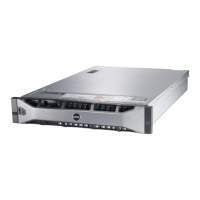28 PowerEdge R720 and R720xd Technical Guide
Table 14 lists the RAID controllers supported on the R720 and R720xd.
Eight-port, external,
6Gb/s PCIe RAID
controller that supports
up to 192 SATA and SAS
HDDs or SSDs
Includes 1GB NV DDR3
cache, premium
performance and feature
set, security SED/EKMS,
and SSD as cache
Eight-port, internal,
6Gb/s PCIe RAID
controller that supports
up to 32 SATA and SAS
HDDs or SSDs
Includes 1GB NV DDR3
cache, premium
performance and feature
set, security SED/EKMS,
and SSD as cache
Eight-port, internal,
6Gb/s PCIe RAID
controller that supports
up to 32 SATA and SAS
HDDs or SSDs
Includes 512MB DDR3
cache, advanced feature
set, security SED/EKMS,
and SSD as cache
Eight-port, internal,
6Gb/s PCIe RAID
controller that is a
low-cost, entry-level
solution supporting up
to 32 SATA and SAS
HDDs or SSDs
Supports hot-plug drives,
expansion, tape drives,
pass-thru
PERC S110
Software
RAID
(R720 only)
3Gb/s SATA software
RAID controller that is a
low-cost, entry-level
solution, supporting up
to four physical disks or
eight virtual disks
Supports hot-plug SATA
drives (4-drive
maximum); no
expansion; Microsoft
®
Windows
®
only
Motherboard
-embedded
SATA
For more information about the latest PERC offerings, see Dell.com/PERC.
CacheCade is a technology that provides automated storage tiering on SSDs with the PERC H810
and H710P. It works by detecting the most-often accessed data and copying it over time to the
CacheCade SSD(s) where that cached data is accessed directly, instead of accessing the hard disk
drives. This can dramatically increase how your applications respond when they are under peak
traffic times and how they perform when response time is critical.
CacheCade provides cost-effective performance scaling for database-type applications that
perform lots of random reads, and saves the cost of adding extra drives.

